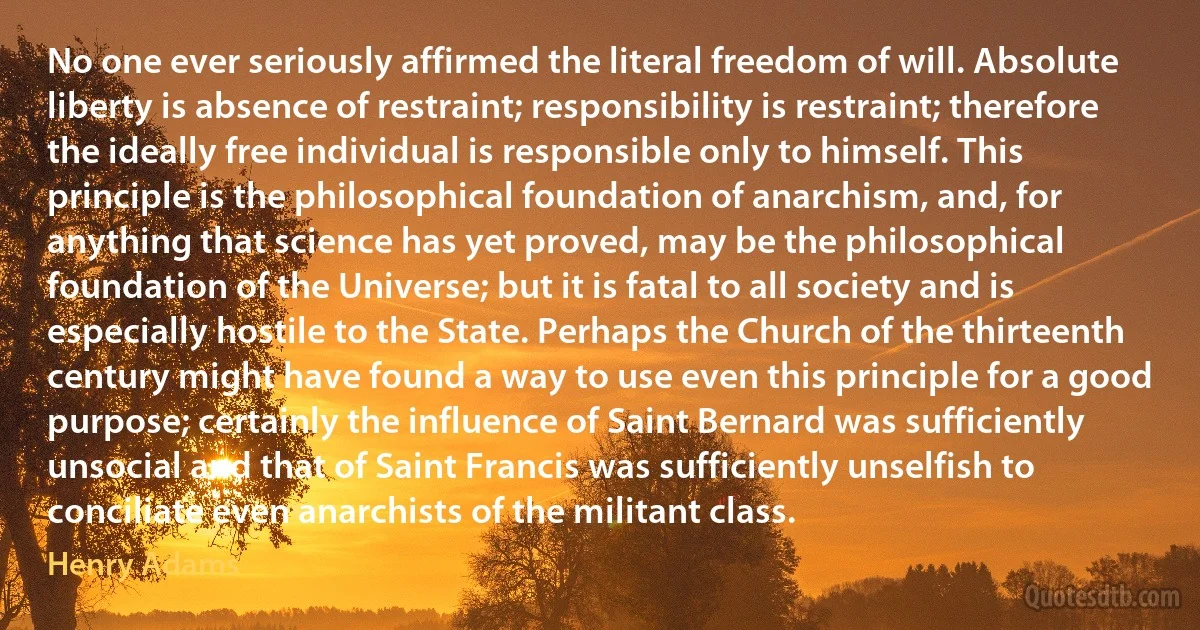
No one ever seriously affirmed the literal freedom of will. Absolute liberty is absence of restraint; responsibility is restraint; therefore the ideally free individual is responsible only to himself. This principle is the philosophical foundation of anarchism, and, for anything that science has yet proved, may be the philosophical foundation of the Universe; but it is fatal to all society and is especially hostile to the State. Perhaps the Church of the thirteenth century might have found a way to use even this principle for a good purpose; certainly the influence of Saint Bernard was sufficiently unsocial and that of Saint Francis was sufficiently unselfish to conciliate even anarchists of the militant class.
Henry AdamsRelated topics
absence affirmed anarchism anything century church found free freedom good liberty literal might militant perhaps purpose saint science state use way yetRelated quotes
The purpose of the State is, as we have already shown in our last lecture, no other than that of the Human Race itself:-to order all its relations according to the Laws of Reason. It is only after the Age of Reason as Science shall have been traversed, and we shall have arrived at the Age of Reason as Art, that the State can reflect upon this purpose with clear consciousness. Till then it constantly promotes this purpose, but without its own knowledge, or free pre meditated design; prompted thereto by the natural law of the development of our Race, even while it has a totally different purpose in view;-with which purpose of its own, Nature has indissolubly bound up the purpose of the whole Race.

Johann Gottlieb Fichte
...what the freedom is that I love, and that to which I think all men intitled. It is not solitary, unconnected, individual, selfish Liberty. As if every Man was to regulate the whole of his Conduct by his own will. The Liberty I mean is social freedom. It is that state of things in which Liberty is secured by the equality of Restraint; A Constitution of things in which the liberty of no one Man, and no body of Men and no Number of men, can find Means to trespass on the liberty of any Person, or any description of Persons in the Society. This kind of liberty is indeed but another name for Justice, as ascertained by wise Laws, and secured by well-constructed institutions.

Edmund Burke
The social conditions of the British people in the early years of the twentieth century cannot be contemplated without deep anxiety. ... We are at the cross-ways. If we stand on the old happy-go-lucky way, the richer classes ever growing in wealth and in number, and ever declining in responsibility, the very poor remaining plunged or plunging even deeper into helpless, hopeless misery, then I think there is nothing before us but savage strife between class and class, with an increasing disorganization, with an increasing destruction of human strength and human virtue-nothing, in fact, but that dual degeneration which comes from the simultaneous waste of extreme wealth and of extreme want.

Winston Churchill
The lesson of the past century has been that where the dignity of the individual has been trampled or threatened - where citizens have not enjoyed the basic right to choose their government, or the right to change it regularly - conflict has too often followed, with innocent civilians paying the price, in lives cut short and communities destroyed.
The obstacles to democracy have little to do with culture or religion, and much more to do with the desire of those in power to maintain their position at any cost. This is neither a new phenomenon nor one confined to any particular part of the world. People of all cultures value their freedom of choice, and feel the need to have a say in decisions affecting their lives.

Kofi Annan
To punish the oppressors of humanity is clemency; to forgive them is cruelty. The severity of tyrants has barbarity for its principle; that of a republican government is founded on beneficence. Therefore let him beware who should dare to influence the people by that terror which is made only for their enemies! Let him beware, who, regarding the inevitable errors of civism in the same light, with the premeditated crimes of perfidiousness, or the attempts of conspirators, suffers the dangerous intriguer to escape and pursues the peaceable citizen! Death to the villain who dares abuse the sacred name of liberty or the powerful arms intended for her defence, to carry mourning or death to the patriotic heart...

Maximilien Robespierre
